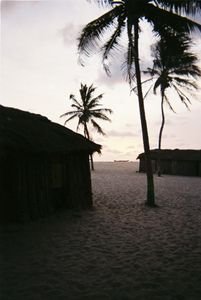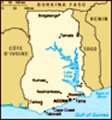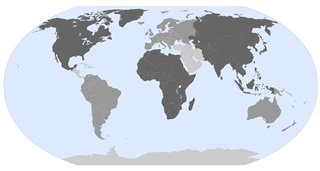Advertisement
Published: March 9th 2008

 Beach huts in Adah Foah
Beach huts in Adah Foah
I stayed in a beach hut with walls made of woven palm leaves. Apparently a mouse or rat also stayed with me in that room and stole my peanuts! The beach exists between an estuary and the ocean. Gorgeous.Apart from the month volunteering in Mampong, I had time to wander about Ghana and see many regions off the tourist trail. In Mali, I followed what seemed like the same trail all the backpackers were following, in the same order. Traveling there was expensive due to the West African Franc (which is tied to the Euro, thus quite strong), and the limited options for tourism. Now in Ghana, using my thousands of Cedis (9930 = 1 USD) I could get anywhere, anytime, easily in a questionable, brightly colored van called a tro-tro.
What is a tro-tro you ask? Any vehicle bigger than a car, and smaller than a full sized bus that serves as a public transport vehicle. I heard first and second hand horror accounts about this mode of transport - from the accidents, to the overcrowding, to the praise god decorations, to the breakdowns, etc. The bus system was expensive and limited and it seemed like only the snobby snob locals would refuse to take the tro-tro. I liked the versatility of the tro-tro. I liked the community of the tro-tro riders. I appreciated that a tro-tro would always be half-full or nearly full (if you were

 Tro Tro
Tro Tro
So I never did take a picture of one, but I did sit many many many hours in them. This is a typical tro tro from google image. It's a nice one. lucky) and ready to go to where you wanted to go..it's the fill and go policy so sometimes you do wait a bit depending on demand for the route. I learned not to sit near the window if it looked like rain. I learned how to 'call dibs' on a seat. I loved how there were NO signs, or routes, or timetables yet I was able to get where I needed to go and could always find someone to help me out if lost. I never once took the wrong tro, unbelievably.
I found this GREAT site with the title: Tro-tro - transport for the people. oh, do read it.
On the tro, I loved the accessibility to street food; at each toll, crossroads, and anyplace anyone wanted to get out, we stopped and the street food came to our windows. It was great. My favorites were the hard boiled eggs, roasted peanuts and FanIce (like a chocolate popsicle but in a bag) . At tro-tro stations, the food options were even more wonderful. Fried plantains, yams, and my all time favorite, the egg sandwich: bread, tomatoes, onions and a greasy omelet for 60 cents. YUM. 
 OMG...the Germans are bigger than me!
OMG...the Germans are bigger than me!
I met a cool German girl who was also traveling solo. She was even cooler because she towered over me! Hi Antje who reads perfect English and will most likely read this caption. We spent a few days freaking out crowds of people and hiking around the Volta Region. We chatted about our dating pool predicament and our love of high heels. Twas good times. Apart from the street food, I was utterly underwhelmed with the food. I don't like fishy fish and everything in the diet, including hot sauces, soups, rice, etc. had a strong fish flavor. Not cool.
If you want to read my article about West African Cuisine, which I submitted to a travel writing contest, click here:
So, with the tro-tros, I could go wherever I wanted, whenever I wanted. I was warned by some PeaceCorps Volunteers to avoid Kumasi and Accra (the two biggest cities) at night alone. Other than that, I felt safe traveling about alone. Oh, I always had my knife under my pillow, but luckily, there were no close calls ever!
My excursions were:
1) Mole National Park - Coming down from Burkina Faso, Mole is a few hours off the main road going south. If you fly into Accra, it's a big, complicated trip that most people pass up, unless they hire a driver. I stayed in a town outside the park grounds to save money and had some interesting conversations with the people in the community neighboring the park. The park is relatively new and used to be the hunting 
 Mole National Park
Mole National Park
The watering hole in the rainy season has lots of water and not so much wildlife...duh...there are many watering holes this time o' year. grounds for the people. Now, if you hunt antelope type deer on park grounds, you are a poacher and can be arrested and fined. The resort is nice and it felt great to swim around in a pool and speak to some fellow Americans (PeaceCorps Volunteers from Togo) in English. The wildlife tour was a bit underwhelming and awkward as it included trapezing through the staff complexes to look at the elephants and monkeys eating from the garbage heap. All the tourists were taking pictures of this. Why? I don't know. The park was nice, but the wildlife scarce as they don't rely on the watering hole in the wet season.
2) the West Coast - Tourists who come to Ghana almost have to do the slave-trade tourism, which includes the tour of two huge restored castles that were used during the gold and slave trade. Ghana was focused on trading gold for most of the slave trade but did make the switch. The interaction between the colonial power, the slave traders, and the different ethnic groups in Ghana is all quite interesting. The Ashanti, know as a R&B artist and one of the most well known and powerful

 View of the fishing boats in Apam
View of the fishing boats in Apam
I stayed one night in the "guesthouse" in the fort at Apam. I had amazing views and fell asleep to the sound of waves. It was lovely. I woke up, however to a BUNCH of kids cutting church and yelling at me through the window. Um, not as lovely. (historically) ethnic groups in Africa, was a big player in the slave trade. They had a policy against enslaving other Ashanti, but went about raiding smaller towns. Captured slaves were traded to the Europeans for guns, which allowed them to be more efficient in rounding up slaves and taking over territory to become more powerful. There is still animosity towards them for those past policies. Whole groups relocated to more isolated areas to escape these raids. Slaves from Ghana itself, and from farther north of Ghana were transported south and out of Ghana's ports.
The country has the most well preserved castles with dungeons on the west coast of Africa, and for this reason, the tourists come. It was difficult to tour them. On both tours, I was the only foreigner touring with a group of Ghanaian tourists. One man kept saying snide comments about the slave traders, then asked if I was ok (which means in Ghanaian English, how are you?). I said fine. He asked me if I was British. I said no...from the United States. He said, well that's not as bad. Haha. I've never heard that before! I went to the West Coast to see the castles but also because I met a cool Australian girl and could stay with her in Cape Coast and bop around the coast from there. Her rasta boyfriend had a taxi, so he took us to the neighboring towns and beaches for day trips. It was quite fun to have hosts on the coasts. While there, it appeared that most study abroad programs base themselves in this VERY touristy town. Also, it seems like ALL the students that study in Ghana are girls. It also appears (this I deduced from 3 days in the town) that they ALL get rasta boyfriends while in Ghana. Nicki (the Australian) and I laughed when the following happened on several occasions: one of her boyfriend's friend noticed I was new, proceeded to question me about how long I'd stay and then look visibly disappointed when I said only a few days. She laughed and said, they are looking for an
obruni (white girl). I couldn't believe all the "obruni, obruni" chanting that I heard in this area. It seems like if there is more exposure, the kids will get less excited about seeing a white person. Nicki's been there 3 months, and the kids in her neighborhood still shout, "obruni, how are you, I'm fine, thank you" (it's a lovely and annoying chant they learn in school).
I left Cape Coast and decided to check out a few more beach towns on the way to Accra. In Apam, I stayed in an old fort, build in the 1600s. It was too small to have dungeons for slave trading but was used to trade other goods. It was a beautiful location and I had the place all to myself. By this time in the trip, the lack of electricity, functioning plumbing, screened windows (I had a mosquito net) and the thinnest mattress ever made did not phase me. I thought the accommodations were great! I recommended the place to a nice couple from Germany, then realized it was probably the grossest place they could ever imagine staying in. Oops. I stayed a night in Winneba (another beach community) and finally, two nights in Kokrobite. Most tourists who go to Ghana stay a night or in Kokrobite because it is only 30 mins from Accra and has a few awesome guesthouses. Thieves come from Accra just to accost tourists in Kokrobite. It is described as a small fishing town, but is more of an extension of the urban area of Accra, in my estimation. I stayed at Big Milly's and had lots of fun. It started as a backpackers' camping place but now has a range of accommodation for different budgets. I stayed in a tent and took cold bucket showers but there rooms with attached showers with hot water. I met some crazy Aussie and European guys who befriended me and bought the drinks. The food was delicious and weekends are packed and crazy with a live band and a dance performance. Anyone who goes to Ghana should stay at least a weekend here.
. It's the most touristy thing I did in Ghana, for sure.
3) the Volta Region - Often overlooked by tourists who only stay in Ghana a week or two, this region is beautiful and chill, compared to the tourist frenzy that is the west coast. From the tops of the hills, you can see Togo! The area used to be German Togoland, then British Togoland and French Togoland, then part was absorbed into Ghana while the rest became French-speaking Togo. Of course, these divisions divide several ethnic groups into English and French speaking countries. However, I learned in West Africa, that local languages are much more common, despite what colonial power used to control the land. Especially with older individuals, children, and women, communication was difficult. Most people are multi-lingual but that doesn't mean they speak English! I learned a little Twi while living in Mampong, but they speak Fante on the West Coast, Ga around the capital and Ewe over in the Volta Region.
The Volta region is chill I think because they don't get the same volume of tourists or revenue from tourism as other parts of Ghana. I was very surprised as I wondered around Ho, the capital of Volta, and didn't run into a single gang of chanting children! I sat at an egg sandwich stand and chatted with two PeaceCorps Ghana volunteers (different ones...they are everywhere), and an older Ewe man. He asked where I was from and about my trip. When I explain how I moved a lot in the states and am traveling now...he told me I was like a lost ship in the ocean. I said, oh, um, ouch, ok.
I decided to head up to some small towns in the mountains and hike around a bit. I met up with a super tall German girl I had met earlier on the West Coast. Even two enormous white girls wandering around a small town cause no stir in Volta. People would cross my path, and say "welcome", and be on their way! At one point I hiked from one town to another because getting there in a car was way longer and difficult (because it was a Sunday). On the 6 km footpath through the jungle, I passed a few people, who gave a little wave, said "welcome" and continued on. They didn't look at me like I was an alien, nor did they address me as "hey obruni", which happened frequently on the West Coast. Volta was relaxing, inexpensive, and had some great community-based tourism projects that were set up with the help of some PeaceCorps Volunteers. Yay for hiking through the jungle! I <3 Volta.
4) the East Coast - A few days before I flew out of the country, I was decided to check out another overlooked part of the country, the coastline east of Accra. I was typing away in a cybercafe in Ho (up in Volta region) when the boys who worked there asked me the questions they ask all foreigners...which country, how long, do you like ghana...blah blah blah. Then they asked me where I was staying. I replied, duh, I can't tell you. They asked me where I was going next. I said, duh, I can't tell you because you could be creepy and follow me. I heard a few stories from other travelers about similar things happening so I decided to play it safe. In the end, they seemed harmless (teenages) so I told them I was going to Keta to see the turtles birthing on the beach. They said...um..you don't want to go to Keta; there are dangerous riots there right now. Riots? I hadn't heard anything, though I wasn't really on top of the current events of the east coast of Ghana. Apparently, there was a cheiftancy dispute going down in the town, the army was siding with one wanna be chief and there was rioting and some killing each night. hmm. I said. The next day in Keta I found that the army was staying in MY hotel. hmm. i said. I went out for some streetfood for dinner when the hotel owner informed me to be quick because there was a curfew in effect from 6pm to 6am due to the riots! Turns out the turtles hadn't started birthing yet because they were waiting for the new moon (um, that's what someone told me), so the riot didn't affect my plans to much. The beach was beautiful, and the next day, I hopped a tro-tro to a big market town, then a huge wooden canoe (with motor and 4 people across, maybe 20 rows full) across an estuary to Adah Foah. This beach is sandwiched between the ocean on one side and the estuary on the other side. It is a beautiful location, and I found a sweet, cheap room staying in a beach hut. I hung out with a fun British family, who told me stories of their world travels. The grandmother was traveling around Africa ages ago and raised both of her daughters in South Africa for their early childhood. The grandfather was doing shady business with diamonds or something, and she didn't know about it! Sounds like the Poisonwood Bible, I know. The daughter did her own traveling around the continent with her sister and later with her husband. Now they all are living in Ghana starting a eco-hotel. The grandma invited me to WOOFF (sp?) on her farm in northern France. It's nice to have options!
Advertisement
Tot: 0.285s; Tpl: 0.013s; cc: 8; qc: 47; dbt: 0.0385s; 1; m:domysql w:travelblog (10.17.0.13); sld: 1;
; mem: 1.2mb








